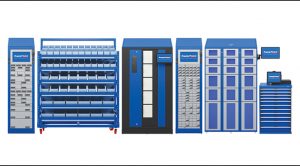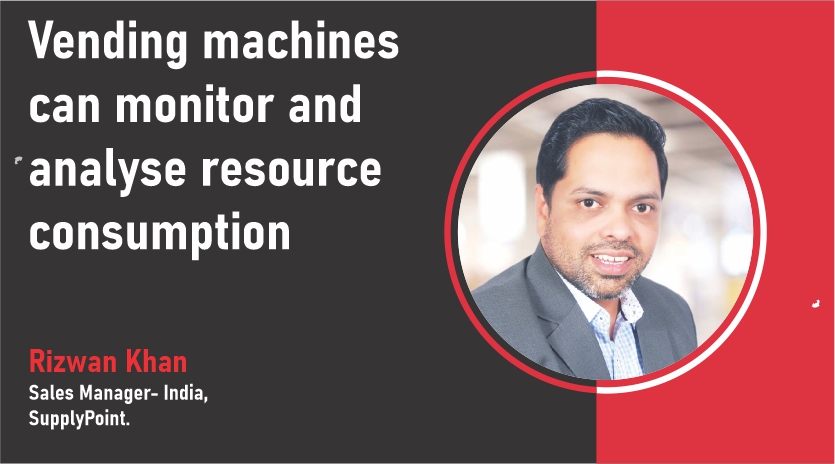Vending machines can monitor and analyse resource consumption
June 9, 2023 2:03 pm
Mr. Rizwan Khan elaborates on how manufacturers can reduce waste, improve efficiency, and achieve sustainability goals by leveraging data analytics, predictive maintenance, and optimising inventory.
How do industrial vending machines contribute to inventory management, cost savings, and resource efficiency in manufacturing?
Our industrial vending machines enhance inventory management by offering real-time usage and demand data. This empowers manufacturers to minimise excess inventory and waste, resulting in substantial cost savings and improved resource efficiency. By advocating for a “just-in-time” approach, our solutions effectively reduce overproduction and unnecessary material consumption.
Additionally, our solutions integrate smart monitoring and analytics capabilities, enabling manufacturers to monitor and analyse their resource consumption. This facilitates the identification of inefficiencies and the implementation of targeted enhancements. Through process optimisation and waste reduction, our solutions actively contribute to the overarching sustainability objectives of manufacturing units.
What are the key practices implemented to enhance production processes?
We have implemented cutting-edge practices from a manufacturing perspective. A crucial practice involves leveraging advanced data analytics to enhance production processes. By analysing extensive data gathered from our vending machines, we can detect patterns, forecast maintenance requirements, and optimise production schedules for improved efficiency and decreased downtime.
Furthermore, we have introduced tailored workflow and control rules to prevent human errors, minimise waste, and enhance manufacturing efficiency. This enables us to simulate and optimise operations, identify bottlenecks, and make well-informed decisions to improve processes.
How do the implemented practices contribute to reducing the carbon footprint?
These practices contribute to our efforts to reduce our carbon footprint by maximising resource efficiency. By utilising data-driven insights and predictive analytics, we can pinpoint areas of waste and implement strategies to minimise energy consumption, material waste, and overall resource usage. By reducing overproduction, optimising production schedules, and implementing automated quality control, we effectively decrease the necessity for rework, scrap, and excessive inventory, reducing environmental impact and waste generation.
What are the benefits of implementing digital twins and AR technology in manufacturing?
Digital twins create virtual replicas of manufacturing processes and machines, enabling real-time monitoring, analysis, and optimisation. This technology enhances productivity, reduces downtime, and minimises resource consumption by identifying bottlenecks and optimising operations.
AR technology provides operators with real-time information and visual guidance, improving their productivity and accuracy. It facilitates efficient training, maintenance, and troubleshooting, improving operational efficiency and decreasing downtime.
Implementing these technologies in Indian manufacturing drives transformation by boosting operational efficiency, enhancing product quality, reducing waste, and enabling predictive and proactive decision-making.

How does your range of solutions impact the transformation?
Our solution lineup, including innovative industrial vending machines like SupplyPoint progressive drawer technology, Lid, and Rotopoint, is spearheading a transformation in the manufacturing industry. These patented technologies streamline inventory management, offer data-driven insights, enhance security, foster sustainability, and seamlessly integrate with Industry 4.0 technologies. They optimise processes, minimise waste, boost efficiency, and empower manufacturers to accomplish their objectives.
What are some challenges faced in modernising Indian manufacturing facilities?
Adopting Industry 4.0 and 5.0 technologies necessitates a skilled workforce proficient in data analytics, AI, robotics, and automation. However, India needs more skilled workers in these domains, emphasising the importance of bridging the skills gap through adequate training and education for successful modernisation.
Cost Considerations: Cost is a significant factor when considering the implementation of advanced technologies and system upgrades. Small and medium-sized enterprises (SMEs) may encounter financial limitations in adopting these technologies; thus, balancing implementation costs and expected returns on investment becomes a crucial challenge.
Resistance to Change: Modernising manufacturing facilities requires a cultural shift and a willingness to embrace new technologies and processes. Overcoming resistance to change and obtaining buy-in from all stakeholders present significant challenges in the process.
What strategies can businesses employ to achieve financial sustainability in green manufacturing while balancing their sustainability objectives and financial goals?
To ensure financial sustainability in green manufacturing, businesses should engage in thorough long-term cost analysis, collaborate with sustainable partners, explore various financing options, and gradually implement initiatives. By evaluating the financial implications, leveraging partnerships, obtaining funding, and adopting a step-by-step approach, companies can successfully balance their sustainability and financial goals.
Which verticals do you see adopting these transformations as front runners?
The automotive, electronics and electrical equipment, pharmaceutical and healthcare, and textile and apparel industries are anticipated to lead the way in adopting transformative technologies. These sectors are propelled by factors such as the increasing demand for electric vehicles, advancements in electronics, the integration of automation and robotics in healthcare, and the requirement for optimisation and customisation in textile and apparel manufacturing.
What is the primary focus of our initiatives in the manufacturing industry?
Our focus and efforts revolve around facilitating sustainable and transformative manufacturing. We continuously innovate our industrial vending machines by integrating cutting-edge technologies. Through real-time data analytics, predictive maintenance capabilities, and inventory optimisation, our solutions support manufacturers in reducing waste, enhancing efficiency, and attaining sustainability objectives.
Cookie Consent
We use cookies to personalize your experience. By continuing to visit this website you agree to our Terms & Conditions, Privacy Policy and Cookie Policy.








